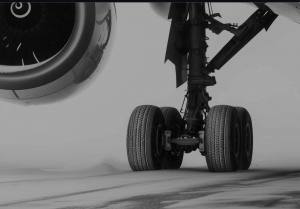
Aircraft Braking Action Reports (ABARs) are today's most precise technology for measuring braking friction – insight that can help mitigate runway excursions

FAA confirms that Aircraft Braking Action Reports (ABARs) are the most effective technology for measuring the actual braking action of landing aircraft Every landing is an opportunity for an ABAR to inform stakeholders with scientific insight about braking action, deceleration, and runway friction conditions.”
— Joe Vickers, CEO, AST CHICAGO, IL, UNITED STATES, October 4, 2024 /EINPresswire.com/ -- Chicago-based Aviation Safety Technologies (AST) is pleased to announce that its ABARnet braking measurement and reporting network has now analyzed and recorded the braking action of more than 23 million aircraft landings using Aircraft Braking Action Reports (ABARs).
The U.S. FAA has stated that ABARs are the most accurate and precise technology for measuring the actual braking friction of landing aircraft – insight that can help improve landing safety and mitigate runway excursions.
Every time an aircraft participating in the ABARnet network executes a landing, an ABAR report about that landing is automatically generated and distributed to pilots on approach, airline operations, airport personnel, ATC, and other stakeholders.
ABARs utilize real-time data from aircraft-based sensors about the actual braking friction that those planes experience when landing, especially on wet, icy, or contaminated runways. These science-based ABARs are in contrast to Pilot Braking Action Reports (PBARs), which rely on a pilot’s subjective experience and intuitive, imprecise evaluation of a landing.
“When pilots of incoming aircraft have access to the precision and accuracy of ABARs, they can make smarter, more informed landing decisions,” says Joe Vickers, CEO of Aviation Safety Technologies. “Airports armed with this same braking friction insight can better manage runway maintenance, scheduling, and airside operations. Every landing is an opportunity for an ABAR to inform stakeholders with scientific insight about braking action, deceleration, and runway friction conditions.”
The cloud-based ABARnet network – formerly known as SafeLand – utilizes algorithms, AI, and machine learning in a self-learning database that's getting smarter with every new landing report.
“AST is proactively working with a number of major airlines and airports today to help improve both aviation safety and operational efficiencies,” says Mr. Vickers. “7,000+ more aircraft landings are recorded every day into the ABARnet database. The ABARnet community is expanding. Decision-makers agree with the FAA and Transport Canada that ABAR technology should be evaluated and, when appropriate, embraced.”
In its August 28, 2023 Advisory Circular, the FAA confirmed that data-based ABARs are the preferred methodology for measuring and reporting on the braking action of landing aircraft. The FAA Advisory states: “ABAR systems provide the highest level of accuracy and precision. ABAR systems most effectively serve as the basis for continuous improvement in the safety assurance program … Recommended action: operators should use the information provided in this AC to review and assess the risks of operations on wet and contaminated runways and update or modify their procedures, as appropriate, to mitigate these risks.”
About ABARnet
AST’s ABARnet braking measurement and reporting network utilizes approved data taken directly from landing aircraft. This approach is recognized by the FAA and Transport Canada as the most precise technology for measuring actual braking friction. Our technology complies with ASTM International Standard E3266, the official aircraft braking measurement standard. Our ABARs are hull-agnostic so we can work with today's diverse fleets – Boeing, Airbus, and other manufacturers. And ABARnet is cloud-based for easy distribution and access by participants anywhere.
About Aviation Safety Technologies LLC
Aviation Safety Technologies (AST) is the world’s leading provider of Aircraft Braking Action Reports, which have been recognized by the FAA and Transport Canada as the most precise methodology for measuring and reporting on real-time braking action and runway friction conditions. Our mission is to elevate aviation safety and operations through data-driven insights. AST is a portfolio company of the Chicago-based Dillon Kane Group, a privately-held group of affiliated companies that builds technology solution businesses.
William Bloomstein
Aviation Safety Technologies+1 617-721-9445email us here
Legal Disclaimer:
EIN Presswire provides this news content "as is" without warranty of any kind. We do not accept any responsibility or liability for the accuracy, content, images, videos, licenses, completeness, legality, or reliability of the information contained in this article. If you have any complaints or copyright issues related to this article, kindly contact the author above.
You just read:
News Provided By
October 04, 2024, 17:56 GMT
EIN Presswire's priority is author transparency. We do our best to weed out false and misleading content. The content above is the sole responsibility of the author who makes it available. If you have any complaints, kindly contact the author above.
Originally published at https://www.einpresswire.com/article/748657148/ast-continues-leadership-in-aviation-safety-with-23-million-aircraft-braking-action-reports-in-self-learning-network







